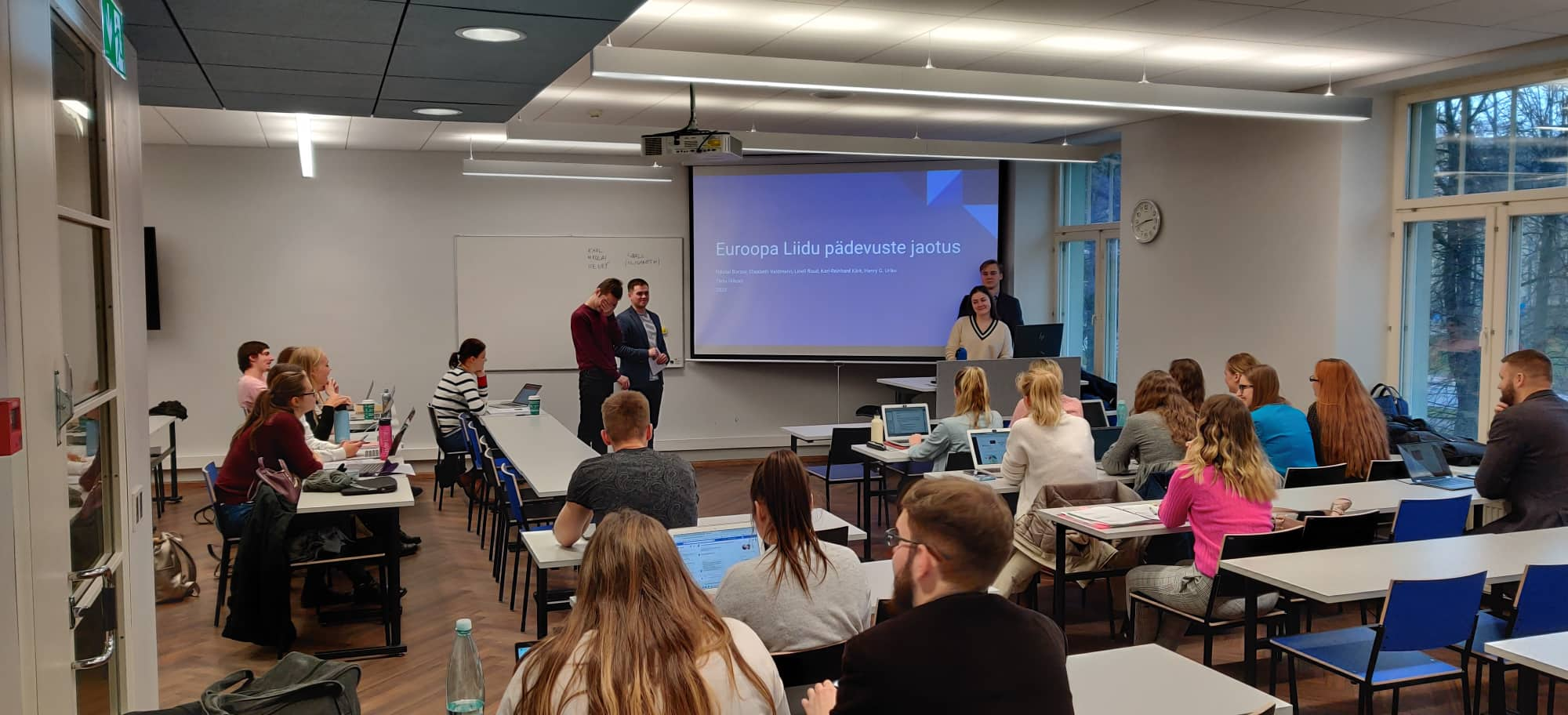UproEU
Courses

Course on EU Law (OIAO.07.076, P2OG.02.157)
The course is in parallel taught to two groups in Tallinn and in Tartu.
The aim of the basic course on EU law is to introduce the fundamental principles of the European Union, the institutional structure and the basic treaties of the EU, the legal drafting procedure and the judicial system of the EU, the relationship between national law and EU law, most important chapters of the substantial law of the EU. The course will deal to a large extent with the case law of the Court of Justice of the EU as the precedents have an essential role in the EU law.)
The aim of the course is to create an understanding of the EU law as a dynamic process and the natural belonging of the EU law into the national legal system. By passing the course the students will build up a ground for working with the EU acquis and an understanding of the legal nature of the EU. They also expand the sense of orientation in the information about the EU and the legal literature about EU law, especially in the sources of the EU law.
European Union Law (P2OG.02.209)
This elective course is taught to the international students of the International Law and Human Rights master’s programme.
The aim of the course on EU law is to introduce the fundamental principles of the European Union, the institutional structure and the fundamental treaties of the EU, the legal drafting procedure and the judicial system of the EU, the relationship between national law and EU law. The course deals to a large extent with the case law of the Court of Justice of the EU (COJEU) as the precedents have an essential role in the EU law. The aim of the course is to create an understanding of the EU law as a dynamic process and the natural belonging of the EU law into the national legal system.
Special Course on European Union Law (P2OG.02.182)
The aim of the course is to deepen the awareness on EU law among students who already have the basic knowledge on EU law and its fundamental principles. The objective is to create an understanding of the structure and the essence of EU secondary law.
Preparation for International Moot Court Competitions (P2OG.02.061, SVOI.02.001)
The course introduces the national moot court competition and best known international moot court competitions (Willem C. Vis Moot, ELMC, European Human Rights Moot, ICC Moot Court, Philip C. Jessup International Law Moot Court Competition, Telders International Law Moot Court Competition) and the possibilities of participation in the University of Tartu team; the course also deals with principles of team selection, teamwork, contribution of team members to the team, doing research for the cases, constructing legal arguments, defending them in the oral round of the competition, and basic principles of public speaking. Frequent mistakes and common setbacks are adressed.
The aim of the course is to prepare the students for participating in international moot court competitions, to introduce the particularities of moot court competitions, which are most popular in the University of Tartu and to create the fundamental set of skills for successful participation in the moot courts. Courtroom skills and etiquette are taught.
European Law Moot Court Competition (P2OG.02.061)
The aim of the course is to give the students an opportunity to gain additional theoretical knowledge in the field of European law, to apply the knowledge to hypothetical cases and to acquire practical experience of litigation through the participation in the moot court competition. Students prepare written memoranda, practice oral pleading and participate in the European Law Moot Court competition.
Special Seminar on International and European Law (P2OG.02.031)
The objective of this course is to examine in depth the developments and problems in the field of international and European Union law
Learning outcomes are that the student will get to know most important developments and debates in contemporary international law and will be made familiar with methodological and theoretical foundations of the discipline that are necessary for successful thesis writing. The content of this course includes the treatment of main problems related to the sources of international law. State responsibility in international law, developments in institutional and material law of the European Union are studied and discussed.
What we have achieved
Our primary objective is to introduce to the students basis of the European Union law. To achieve this, threre`s a European Union Law course in the Faculty of Law`s compulsory syllabus. In addition to this main course, we have started with our elective course directed to the international students of the International Law and Human Rights master’s programme. During the fall semester 22 international students attended this course.
We have also supervised both undergraduate and graduate theses throughout the year. This includes arranging group meetings, having students to give feedback on each other’s work and we have also directed them to make posters about their work, with the aim of constructively summarizing their theses.
We have participated in various international practice courts every year. Every spring, the subject Preparation for International Moot Court Competition begins, which prepares students for the Moot Court competition in the fall.
During this spring semester, there is also a Special Seminar on International and European Law taking place, in which students examine in depth the developments and problems in the field of international and European Union law.


